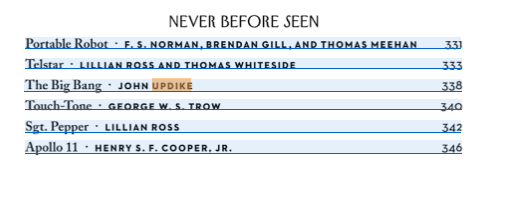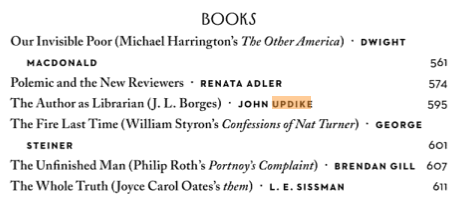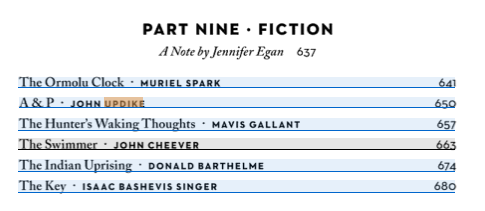Category Archives: Books
Updike included in aging masculinity in the American novel study
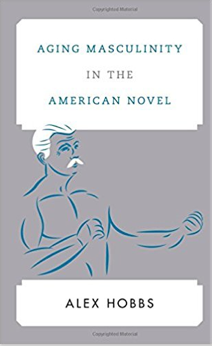 It’s been out for a year, but sometimes it takes a while to discover academic books. One of those titles that was displayed at the recent American Literature Association conference in Boston was Aging Masculinity in the American Novel, by Alex Hobbs, published by Rowman & Littlefield in May 2016.
It’s been out for a year, but sometimes it takes a while to discover academic books. One of those titles that was displayed at the recent American Literature Association conference in Boston was Aging Masculinity in the American Novel, by Alex Hobbs, published by Rowman & Littlefield in May 2016.
In a chapter titled “Late Writing,” Hobbs focuses on John Updike, Philip Roth, Don DeLillo, and Cormac McCarthy, while in her conclusion she asks,
“Why should sexual identity be any less valued than professional identity, for example? Roland Blythe contends, ‘Old age is not an emancipation from desire for most of us, that is a large part of its tragedy. . . . Most of all [the old] want to be wanted.’ This is certainly accurate for Roth and Updike’s protagonists, and, to a lesser degree, perhaps, Paul Auster, Ethan Canin, and Anne Tyler’s characters, too. The long-term pessimism that is displayed by Roth and Updike’s men, but not by those in Auster, Canin, and Tyler’s novels, arguably stems from the way they try to use sexual relationships as their project; they rely on women to make their life whole and worthwhile. Thus, while there should be no vilification of the need or desire to retain an active sex life in old age, the characters analyzed here indicate that it is unhealthy to make this the sole focus for this stage of life. ”
Hobbes earned her doctorate in English from Anglia Ruskin University and teaches through The Open University. Her critical essays have appeared in Journal of American Culture, Critique: Studies in Contemporary Fiction, and Philip Roth Studies.
Updike’s sartorial style on display in new coffee table book
Everyone has a style, a “look”—even John Updike, who’s more famous for his elegant and erudite literary style. That style is on display in a new book by Terry Newman, Legendary Authors and the Clothes They Wore, which comes out in hardcover on June 27, 2017.
From the HarperCollins website:
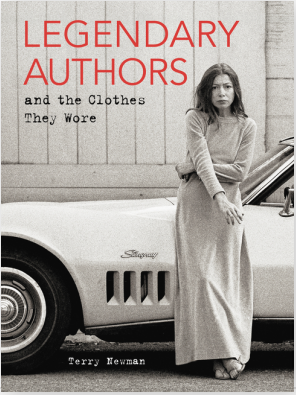 Discover the signature sartorial and literary style of fifty men and women of letters, including Maya Angelou; Truman Capote; Colette; Bret Easton Ellis; Allen Ginsberg; Patti Smith; Karl Ove Knausgaard; and David Foster Wallace; in this unique compendium of profiles—packed with eighty black-and-white photographs, excerpts, quotes, and fast facts—that illuminates their impact on modern fashion.
Discover the signature sartorial and literary style of fifty men and women of letters, including Maya Angelou; Truman Capote; Colette; Bret Easton Ellis; Allen Ginsberg; Patti Smith; Karl Ove Knausgaard; and David Foster Wallace; in this unique compendium of profiles—packed with eighty black-and-white photographs, excerpts, quotes, and fast facts—that illuminates their impact on modern fashion.
Whether it’s Zadie Smith’s exotic turban, James Joyce’s wire-framed glasses, or Samuel Beckett’s Wallabees, a writer’s attire often reflects the creative and spiritual essence of his or her work. As a non-linear sensibility has come to dominate modern style, curious trendsetters have increasingly found a stimulating muse in writers—many, like Joan Didion, whose personal aesthetic is distinctly “out of fashion.” For decades, Didion has used her work, both her journalism and experimental fiction, as a mirror to reflect her innermost emotions and ideas—an originality that has inspired Millennials, resonated with a new generation of fashion designers and cultural tastemakers, and made Didion, in her eighties, the face of Celine in 2015.
Legendary Authors and the Clothes They Wore examines fifty revered writers—among them Samuel Beckett; Quentin Crisp; Simone de Beauvoir; T.S. Eliot; F. Scott and Zelda Fitzgerald; Malcolm Gladwell; Donna Tartt; John Updike; Oscar Wilde; and Tom Wolfe—whose work and way of dress bears an idiosyncratic stamp influencing culture today. Terry Newman combines illuminating anecdotes about authors and their work, archival photography, first-person quotations from each writer and current designers, little-known facts, and clothing-oriented excerpts that exemplify their original writing style.
Each entry spotlights an author and a signature wardrobe moment that expresses his or her persona, and reveals how it influences the fashion world today. Newman explores how the particular item of clothing or style has contributed to fashion’s lingua franca—delving deeper to appraise its historical trajectory and distinctive effect. Legendary Authors and the Clothes They Wore is an invaluable and engaging look at the writers we love—and why we love what they wear—that is sure to captivate lovers of great literature and sophisticated fashion.
New De Bellis book on Updike slated for summer release
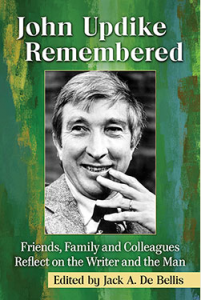 John Updike Remembered: Friends, Family and Colleagues Reflect on the Writer and the Man, edited by Jack De Bellis, will be published this summer by McFarland Books and is now available to pre-order. The softcover volume features 53 remembrances that “present a prismatic view of the two-time Pulitzer Prize winner and his work through anecdote and insight” as “interviews and essays from family, friends and associates reveal sides of the novelist perhaps unfamiliar to the public—Updike the high school prankster, the golfer, the creator of bedtime stories, the charming ironist, the faithful correspondent with scholars, the devoted friend and the dedicated practitioner of his craft,” as described on the McFarland website. List price is $29.95.
John Updike Remembered: Friends, Family and Colleagues Reflect on the Writer and the Man, edited by Jack De Bellis, will be published this summer by McFarland Books and is now available to pre-order. The softcover volume features 53 remembrances that “present a prismatic view of the two-time Pulitzer Prize winner and his work through anecdote and insight” as “interviews and essays from family, friends and associates reveal sides of the novelist perhaps unfamiliar to the public—Updike the high school prankster, the golfer, the creator of bedtime stories, the charming ironist, the faithful correspondent with scholars, the devoted friend and the dedicated practitioner of his craft,” as described on the McFarland website. List price is $29.95.
“Contributors include: his first wife, Mary Pennington, and three of their children; high school and college friends; authors John Barth, Joyce Carol Oates and Nicholson Baker; journalists Terri Gross and Ann Goldstein; and scholars Jay Parini, William Pritchard, James Plath, and Adam Begley, Updike’s biographer.”
De Bellis, who is Professor Emeritus of English at Lehigh University, was a founder of The John Updike Society and served on the board of directors from 2009-14. A member of the editorial board of The John Updike Review, he is best known among scholars for the books he has edited or written on Updike:
—John Updike, 1967-1993: A Bibliography of Primary and Secondary Sources (Greenwood Publishing Group, 1994)
—The John Updike Encyclopedia (Greenwood Publishing Group, 2000)
—John Updike: The Critical Responses to the “Rabbit” Saga (Oak Knoll Press, 2003)
—John Updike: A Bibliography of Primary and Secondary Materials, 1948-2007, co-authored by Michael Broomfield (Oak Knoll Press, 2008)
—John Updike’s Early Years (Lehigh University Press, 2013)
Updike one of three to comment on Pamuk novel
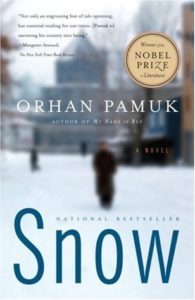 “Back in 2004,” Literary Hub writes, “three literary heavyweights reviewed Orhan Pamuk’s novel of Modern Turkey,” and in the article “Atwood, Updike and Hitchens on Snow“ the site compiles remarks from three individual book reviews.
“Back in 2004,” Literary Hub writes, “three literary heavyweights reviewed Orhan Pamuk’s novel of Modern Turkey,” and in the article “Atwood, Updike and Hitchens on Snow“ the site compiles remarks from three individual book reviews.
In a review published in the August 30, 2004 New Yorker, Updike concluded, “If at times Snow seems attenuated and opaque, we should not forget that in Turkey, insofar as it partakes of the Islamic world’s present murderous war of censorious fanaticism versus free speech and truth-seeking, to write with honest complexity about such matters as head scarves and religious belief takes courage. Pamuk, relatively young as he is, at the age of fifty-two, qualifies as that country’s most likely candidate for the Nobel Prize, and the near-assassination of Islam’s last winner must cross his mind. To produce a major work so frankly troubled and provocatively bemused and, against the grain of the author’s usual antiquarian bent, entirely contemporary in its setting and subjects, took the courage that art sometimes visits upon even its most detached practitioners.”
On Rabbit’s alter ego and new LOA editions
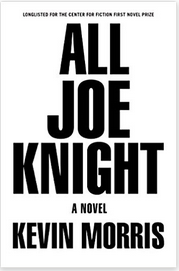 On Feb. 21 in New York City at a Library of America event, writer Kevin Morris and Cornell professor Glenn Altschuler took the stage to discuss Updike’s legacy.
On Feb. 21 in New York City at a Library of America event, writer Kevin Morris and Cornell professor Glenn Altschuler took the stage to discuss Updike’s legacy.
Morris, who had “adopted” John Updike: The Collected Stories through the Guardian of American Letters Fund, is the author of All Joe Knight, a novel in which he “engages in a dialogue with Updike’s famous quartet of Rabbit novels,” as a March 9, 2017 LOA website story summarizes.
“Like Rabbit Angstrom, Morris’s protagonist Joe Knight is from Pennsylvania, is unhappily married to a woman named Janice, and is haunted by the sense that his entire life has been a falling-off since the days when he was a high-school basketball star. Perhaps appropriately for America in the early twenty-first century, however, Joe is even angrier and more profane than his predecessor ever was.
“The resonances between these two characters, along with Updike’s ability to capture the passions, doubts, and longings of America’s post-World War II generation—to ‘give the mundane its beautiful due,’ to use his oft-quoted phrase—were the grist for Morris’s talk with Altschuler.
“Updike fans will be excited to learn that Library of America inaugurates a planned five-volume edition of his novels in 2018; the lead-off volume will include the first book in the Rabbit Angstrom sage, 1960’s Rabbit, Run.”
New book analyzes writers’ tendencies
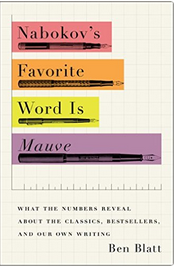 Scholars and would-be writers just got a resource that’s so fascinating they might not be able to get past the data to formulate a thesis of their own. In Nabokov’s Favorite Word is Mauve, Ben Blatt combines statistical analysis and literature to produce a study that quantifies writers’ tendencies. As an article from Publisher’s Weekly notes, “Using a database of thousands of books and hundreds of millions of words, Blatt answers everything from what are our favorite authors’ favorite words to which contemporary writer uses the most clichés to the controversial topic of adverb usage.”
Scholars and would-be writers just got a resource that’s so fascinating they might not be able to get past the data to formulate a thesis of their own. In Nabokov’s Favorite Word is Mauve, Ben Blatt combines statistical analysis and literature to produce a study that quantifies writers’ tendencies. As an article from Publisher’s Weekly notes, “Using a database of thousands of books and hundreds of millions of words, Blatt answers everything from what are our favorite authors’ favorite words to which contemporary writer uses the most clichés to the controversial topic of adverb usage.”
The article “Danielle Steel Loves the Weather and Elmore Leonard Hates Exclamation Points: Literature by the Numbers” shares some of his findings, and of course Updike turns up on the lists.
Which three writers use the least amount of exclamation points per 100,000 words? That would be Elmore Leonard with 49 in 45 novels, followed by Ernest Hemingway with 59 in 10 novels and John Updike with 88 in 26 novels. Who uses the most exclamation points? James Joyce with 1105 in 3 novels, followed by Tom Wolfe (929 in 4 novels) and Sinclair Lewis (844 in 19 novels).
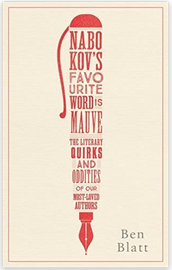 Which three writers use the least number of clichés per 100,000 words? Jane Austen (45 in 6 novels), Edith Wharton (62 in 22 novels) and Virginia Woolf (62 in 9 novels). Purveyors of the most clichés in their writing? James Patterson (160 in 22 Alex Cross books), Tom Wolfe (143 in 4 novels), and Kurt Vonnegut (140 in 14 novels). Updike was rated as producing 96 per 100,000 words over the course of 26 novels, which was one better than Toni Morrison did over 10 novels and six better than Twain did over the course of 13 novels.
Which three writers use the least number of clichés per 100,000 words? Jane Austen (45 in 6 novels), Edith Wharton (62 in 22 novels) and Virginia Woolf (62 in 9 novels). Purveyors of the most clichés in their writing? James Patterson (160 in 22 Alex Cross books), Tom Wolfe (143 in 4 novels), and Kurt Vonnegut (140 in 14 novels). Updike was rated as producing 96 per 100,000 words over the course of 26 novels, which was one better than Toni Morrison did over 10 novels and six better than Twain did over the course of 13 novels.
What about the weather? Danielle Steel mentioned the weather in the first sentence of her 92 novels a whopping 46 percent of the time, followed by John Steinbeck (26 percent), Nicholas Sparks (22 percent), Willa Cather (21 percent), Stephen King (17 percent), Nora Roberts (16 percent), Tom Clancy (15 percent), Edith Wharton (14 percent), Janet Evanovich (10 percent), Charles Dickens (10 percent), D.H. Lawrence (8 percent), John Updike (8 percent), and Mark Twain (8 percent).
Review: Imagination and Idealism in John Updike’s Fiction
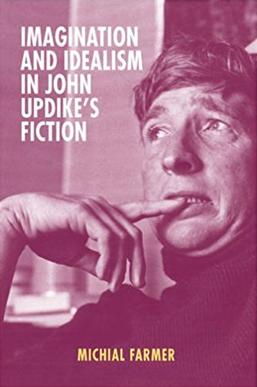 Updike criticism over the past several decades has gravitated toward the Rabbit tetralogy. In Imagination and Idealism in John Updike’s Fiction (Camden House, 2017, cloth, 228pp.), Michial Farmer bucks that trend, leaving Rabbit out of his discussion entirely. Given Updike’s exhaustive (and exhausting) oeuvre, it’s no surprise that, despite the broad title, only a handful of novels make the cut for Farmer’s exploration of Updike and the imagination.
Updike criticism over the past several decades has gravitated toward the Rabbit tetralogy. In Imagination and Idealism in John Updike’s Fiction (Camden House, 2017, cloth, 228pp.), Michial Farmer bucks that trend, leaving Rabbit out of his discussion entirely. Given Updike’s exhaustive (and exhausting) oeuvre, it’s no surprise that, despite the broad title, only a handful of novels make the cut for Farmer’s exploration of Updike and the imagination.
As the back cover note summarizes, Farmer “argues that, while the imagination is for Updike a means of human survival and a necessary component of human flourishing, it also has a destructive, darker side, in which it shades into something like philosophical idealism. Here the mind constructs the world around it and then, unhelpfully, imposes this created world between itself and the ‘real world.’ In other words, Updike is not himself an idealist but sees idealism as a persistent temptation for the artistic imagination.”
In a first chapter, “John Updike and the Existentialist Imagination,” Farmer posits that while Updike “cannot endorse Sartre’s atheism or the nihilism that lurks just beyond his celebration of humanity’s radical freedom,” he nonetheless “uses Sartrean metaphysics as a jumping-off point for his own, more Kierkegaardian, reflections.” The fullest discussion of the latter remains David Crowe’s recent study, but for the intended purpose of this volume Farmer does a nice job of setting the stage for a study of the imaginative nature of Updike’s work, weighing Sartre’s suggestion that the human imagination, “and in particular the aesthetic imagination—can be a way to fight against meaninglessness.”
According to Farmer, Updike’s “job as a fiction writer” is to “use his powerful imagination, and the language that makes up its currency, to falsify the material world” that exists in opposition to the self and “bestow on it an order that does not properly speaking belong to it, but in bestowing that order to preserve and re-present it. The imagination thus counts among the highest and most important human faculties,” Farmer writes.
In the 15 chapters that follow, Farmer treats Updike’s works loosely chronologically but also finds a way to order them topically with the aid of a five-part section structure:
- The “Mythic Immensity” of the Parental Imagination
- Collective Hallucination in the Adulterous Society
- Imaginative Lust in the Scarlet Letter Trilogy
- Female Power and the Female Imagination
- The Remembering Imagination
Regarding what he calls the “parental imagination,” Farmer argues, “Mothers, in Updike’s early fiction, tend to create imaginative worlds for their sons to live in, and these worlds, when confronted with the world of mere things, tend to crush the sons for whom they were created.” That’s a big claim, and the chapters supporting it are probably the most enticing to consider, yet also the most elusive—especially when Farmer at times seems to conflate “force of will” with “force of imagination.” Still, his analyses of “Flight,” “His Mother Inside Him,” “Ace in the Hole,” “A Sandstone Farmhouse,” “The Cats,” The Centaur, and Of the Farm are engaging.
The chapters themselves read like brief imaginative essays: a combination of scholarship and readability that’s well reasoned and written in such a way as to anticipate reader questions. As a result, the author, while discussing texts that would be familiar to most Updike scholars and aficionados, confidently proceeds without feeling the need to cite a tremendous amount of secondary sources—only those that seem necessary to him. Some scholars may see that as a negative. Nowhere near all of the secondary sources for Updike’s Scarlet Letter trilogy, for example, are cited. Yet, underlying his arguments, Farmer demonstrates an awareness of the range of Updike scholarship throughout his chapter discussions, quoting from both the very first monograph (the Hamiltons) and the most recent one (Crowe).
Some of Farmer’s arguments have an “of course” feel to them, perhaps because the chapters’ arguments are compressed and proceed so methodically—with just enough theoretical grounding, contextual references, and examples from Updike’s works to lead readers to what feels like a foregone conclusion. Sometimes it’s a slightly new twist on familiar theory. For example, Updike’s oft-stated intent “’to transcribe middleness with all its grits, bumps, and anonymities, in its fullness of satisfaction and mystery,’ is,” Farmer writes, “in part a method of keeping the human imagination honest: we may not be able to have perfect access to the material world, but the material world periodically, perhaps even constantly, makes itself known by tearing down the imagination constructions we build on its back. The author’s fidelity to the world is thus held in dialectical tension with his imaginative project; the two are always in dialogue, and the human self is always moving between the two of them—forever building, forever destroying.” Mostly, it’s the attention paid to works that are too often ignored by other scholars that’s refreshing.
In the “adulterous society” section Farmer discusses “Man and Daughter in the Cold,” “Giving Blood,” “The Taste of Metal,” “Avec la Bébé-Sitter,” “The Hillies,” Marry Me, and Couples; in addition to The Witches of Eastwick, for the section on female power he considers “Marching through Boston,” “The Stare,” “Report of Health,” “Living with a Wife,” and “Slippage”; and in the final section he draws on examples from Memories of the Ford Administration, “In Football Season,” “First Wives and Trolley Cars,” “The Day of the Dying Rabbit,” “Leaving Church Early,” and “The Egg Race,” in addition to the more frequently discussed “The Dogwood Tree,” “A Soft Spring Night in Shillington,” and “On Being a Self Forever.”
One of this book’s strengths is that does manage to reconsider old concepts in the pursuit of new, and to explore a satisfying range of critical, theoretical, and philosophical arguments without insulting the intelligence of those readers who might already know the terms and their meanings. That kind of writing is hard to pull off, yet the author manages to do so with grace. As a result, Imagination and Idealism in John Updike’s Fiction is an easy read—one of the more engaging and accessible monographs on an author that I’ve encountered in recent years. It holds appeal not only for Updike scholars, but also for readers with more than a casual interest in Updike. This book helps readers to appreciate the sometimes erratic or unexplainable behavior of many of Updike’s characters, who live in worlds partially created by their own vivid and often conflicted imaginations.
Reviewed by James Plath
Book on famous stutterers includes chapter on Updike
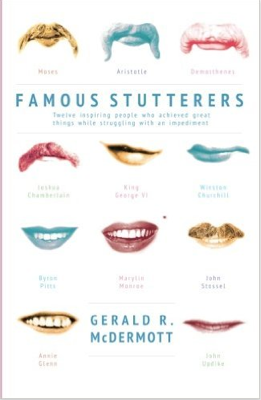 In Chapter 12 of Famous Stutterers, author Gerald R. McDermott begins,
In Chapter 12 of Famous Stutterers, author Gerald R. McDermott begins,
“Until John Updike (1932-2009), no one had ever described stuttering with such dead-on precision. Once he compared it to a traffic jam. ‘I have lots of words inside me: but at moments, like rush-hour traffic at the mouth of a tunnel, they jam.’
“He painted a picture of facial tics that will make any relative of a stutterer groan with recognition.
Viewing myself on taped television, I see the repulsive symptoms
of an approaching stammer take possession of my face—an
electronically rapid flutter of the eyelids, a distortion of the mouth
as of a leather purse being cinched, a terrifying hardening of the
upper lip, a fatal tensing and a lifting of the voice
“All stutterers will nod knowingly when they hear him refer to that ‘untrustworthy’ part of himself that ‘can collapse at awkward or anxious moments into a stutter.’ They might smile at his philosophical conclusion that stuttering is a sign of the ‘duality of our existence, the ability of the body and soul to say no to one another.’ Or his reflection that a stammer is the acknowledgement of unacknowledged complexities surrounding even the simplest of verbal exchanges.”
Other famous stutterers included in the book are Moses, Aristotle, Demosthenes, Joshua Chamberlain, King George VI, Winston Churchill, Byron Pitts, Marilyn Monroe, John Stossel, and Annie Glenn.
New Yorker’s The ’60s: The Story of a Decade features Updike
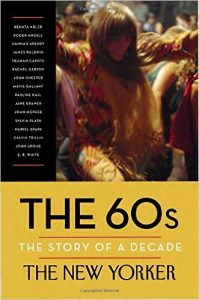 The New Yorker has released a third volume in a decade-by-decade anthology series collecting pieces published in the famed magazine that best reflect each decade.
The New Yorker has released a third volume in a decade-by-decade anthology series collecting pieces published in the famed magazine that best reflect each decade.
John Updike pops up several times in The ’60s: The Story of a Decade, which was published in hardcover on October 25, 2016. The substantial volume, published by Random House, runs 720 pages, and as a starred Kirkus review gushed, “The contributor list is an embarrassment of riches . . . The hits continue. Bring on the ’70s.”
Included are pieces from Renata Adler, Roger Angell, Hannah Arendt, Michael J. Arlen, James Baldwin, Whitney Balliett, Donald Barthelme, Jacob Brackman, Truman Capote, Rachel Carson, John Cheever, Henry S.F. Cooper, Jr., James Dickey, Mavis Gallant, Brendan Gill, Penelope Gilliatt, Emily Hahn, Geoffrey T. Hellman, Nat Hentoff, Hendrik Hertzberg, Ted Hughes, Charlayne Hunter-Gault, Randall Jarrell, Pauline Kael, E.J. Kahn, Jr., Katharine T. Kinkead, Hans Koningsberger, Jane Kramer, Daniel Lang, Flora Lewis, A.J. Liebling, Andy Logan, D. Lowe, Dwight MacDonald, Donald Malcolm, Terrence Malick, Faith McNulty, John McPhee, Thomas Meehan, Ved Mehta, James Merrill, Jonathan Miller, Lewis Mumford, Howard Nemerov, F.S. Norman, Sylvia Plath, Robert Rice, Harold Rosenberg, Lillian Ross, Richard H. Rovere, Muriel Rukeyser, Xavier Rynne, Jonathan Schell, Winthrop Sergeant, Ann Sexton, Isaac Bashevis Singer, L.E. Sissman, Muriel Spark, George Steiner, James Stevenson, Donald Stewart, May Swenson, Calvin Trillin, George W.S. Trow, Kenneth Tynan, John Updike, Kevin Wallace, Joseph Wechsberg, E.B. White, Thomas Whiteside, and Ellen Willis.
Here’s the Amazon link.


